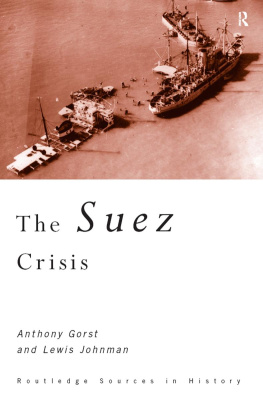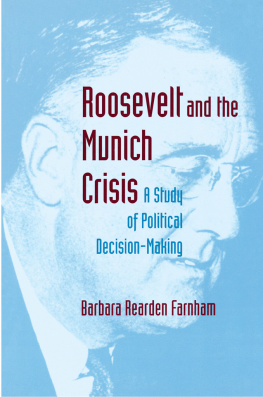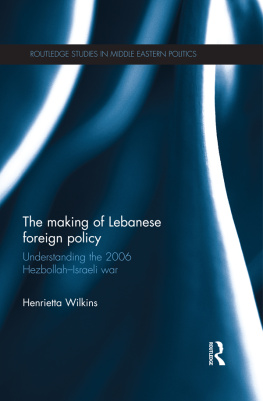DECISION-MAKING IN GREAT BRITAIN
DURING THE SUEZ CRISIS
First published 2003 by Ashgate Publishing
Published 2016 by Routledge
2 Park Square, Milton Park, Abingdon, Oxon OX14 4RN
711 Third Avenue, New York, NY 10017
Routledge is an imprint of the Taylor & Francis Group, an informa business
Copyright Bertjan Verbeek
Bertjan Verbeek has asserted his right under the Copyright, Designs and Patents Act, 1988, to be identified as author of this work.
All rights reserved. No part of this book may be reprinted or reproduced or utilised in any form or by any electronic, mechanical, or other means, now known or hereafter invented, including photocopying and recording, or in any information storage or retrieval system, without permission in writing from the publishers.
Notice:
Product or corporate names may be trademarks or registered trademarks, and are used only for identification and explanation without intent to infringe.
British Library Cataloguing in Publication Data
Verbeek, Bertjan, 1960
Decision-making in Great Britain during the Suez Crisis : small groups and a persistent leader
1. Great Britain. Cabinet - Decision making 2. Group decision
making - Great Britain - History - 20th century 3. Great
Britain - Foreign relations - Egypt 4. Great Britain
Foreign relations - 1945-1964 5. Egypt - Foreign relations
Great Britain 6. Egypt - Foreign relations - 1952-1970
7. Egypt - History - Intervention, 1956
I. Title
327.4'1'062
Library of Congress Cataloging-in-Publication Data
Verbeek, Bertjan, 1960
Decision-making in Great Britain during the Suez crisis : small groups and a persistent leader / Bertjan Verbeek.
p. cm.
Includes bibliographical references and index.
ISBN 0-7546-3253-9
1. Egypt--History--Intervention, 1956. 2. Great Britain--Foreign
relations--1945-1964--Decision making. I. Title.
DT107.83.V47 2003
327.41062'09'045--dc21
2002041752
ISBN 13: 978-0-7546-3253-5 (hbk)
ISBN 13: 978-1-138-27755-7 (pbk)
Publishers Note
The publisher has gone to great lengths to ensure the quality of this book but points out that some imperfections from the original may be apparent.
Contents
This book would not have been possible without the criticism over the years of Agnes Akkerman, Jim Allen, Jean Blondel, Michael Doyle, Paul t Hart, Charles F. Hermann, Hans Hermann Hoppe, Leo Huberts, Hans Keman, Kees van Kersbergen, Robert H. Lieshout, Mitya New, Michael Nicholson, Wim Noomen, Bob Reinalda, Steve Smith, Susan Strange, Douglas T. Stuart, Bengt Sundelius, Eric Stern, Sjaak Toonen, Anna van der Vleuten, and D.C. Watt.
I am especially grateful to the hospitality of Laurence Morel and Kevin and Sarah Woodfield who gave me a real home during the archival research. At the Public Record Office Michelle Ann Lewis was an inestimable help. I am indebted to the staff at Ashgate for their prompt and accurate advice.
I wish to express my gratitude to SAGE Publications Ltd. for permission, on behalf of copyright holder NISA: Nordic International Studies Association, to re-use the following material: Bertjan Verbeek, Do Individual and Group Beliefs Matter? British Decision-Making during the 1956 Suez Crisis', Cooperation and Conflict. Nordic Journal of International Studies, Vol. 29, 1994, pp. 307-32. The theme that images shared by the foreign policy elite may affect the contents of decisions taken by small groups suffering from Groupthink found its first formulation in that article. In that same publication appeared as tables 1 and 2 (on pages 317 and 320, respectively).
At least three compelling reasons exist for another book on Suez. First, a book-length application of a foreign policy analysis framework to British decision-making during Suez was still missing. Although many books on foreign policy analysis refer to the case, no full analysis has so far been conducted. This book thus offers something radically different compared to most studies of Suez, most of which are mainly historical analyses.
Second, this study offers a rather new interpretation of British decision-making on Suez. Many existing studies of Suez emphasize the role of Prime Minister Sir Anthony Eden and often focus on the matter of collusion with Israel. This study demonstrates that small group dynamics in the institutional context of cabinet decision-making in the British political system is much more important in explaining British decision-making than the personality and physical condition of the Prime Minister at the time. One of the few studies referring to the group aspect of decision-making as a major explanation of events is Robert Rhodes James's biography of Anthony Eden (James, 1986; cf. Louis, 1986). This book will show that individual factors related to the Prime Minister, notably his cognitive belief system and leadership style, mattered. However, contrary to many other books on Suez, this study argues that they were not as much related erratically to his temper or weak health, but systematically to the worldview he had built up in his early experience in politics. Moreover, the Prime Minister's impact was felt through the mechanism of the small groups he chaired.
Third, this book will be equally important to the (sub)disciplines of International Relations and Foreign Policy Analysis. The study will be of interest to scholars of International Relations because the empirical problem described above leaves the dominant explanation of international relations, neorealism, rather puzzled. This study thus offers the possibility of determining more precisely the interrelationship between systemic constraints on states behaviour and the actual behaviour of states under such constraints. It thus adds second and first image explanations to systemic ones. The book is also directed at foreign policy scholars because rather than merely pointing to the explanatory value of individual cognitive beliefs systems and small group dynamics it will demonstrate the extent to which these variables actually explain British foreign policy at the time. Many studies of cognitive belief systems, small groups dynamics as well as bureaucratic politics limit their analysis to describing the occurrence of such factors, yet fail to argue to what extent they really matter in explaining policies. This book will.
Chapter 1
Introduction: The Puzzle of Suez
Introduction
This book puts forward three major claims. First, decision-making in Great Britain during the Suez crisis of 1956 was concentrated in the hands of a small group of policy-makers, who met in different organizational settings. Throughout the crisis the group would sometimes meet as part of the full Cabinet. At different instances, it would gather as the so-called Egypt Committee. On other occasions different members of the group would convene informally. Second, the deliberations of this small group of policy-makers failed to meet important procedural criteria of high quality decision-making. This failure contributed to what in the literature generally is considered a policy fiasco: the Anglo-French bombing of Egypt and invasion of the area of the Suez Canal in October-November 1956. Small group dynamics, including the leadership style of Prime Minister Sir Anthony Eden, constitute the major explanation of the group's poor performance. Moreover, parts of the contents of the group's decisions are related to its common perspective on Anglo-American relations regarding the Middle East and to the Prime Minister's individual beliefs regarding the conduct of international affairs. Third, the institutional setting of the British political system is conducive to promoting the impact of small groups and their leader on decision-making, especially in crisis situations. The hierarchy between Prime Minister, Senior Ministers, Junior Ministers, and backbenchers threatens the quality of decision-making, within the full Cabinet as well as in special bodies like the Egypt Committee.









